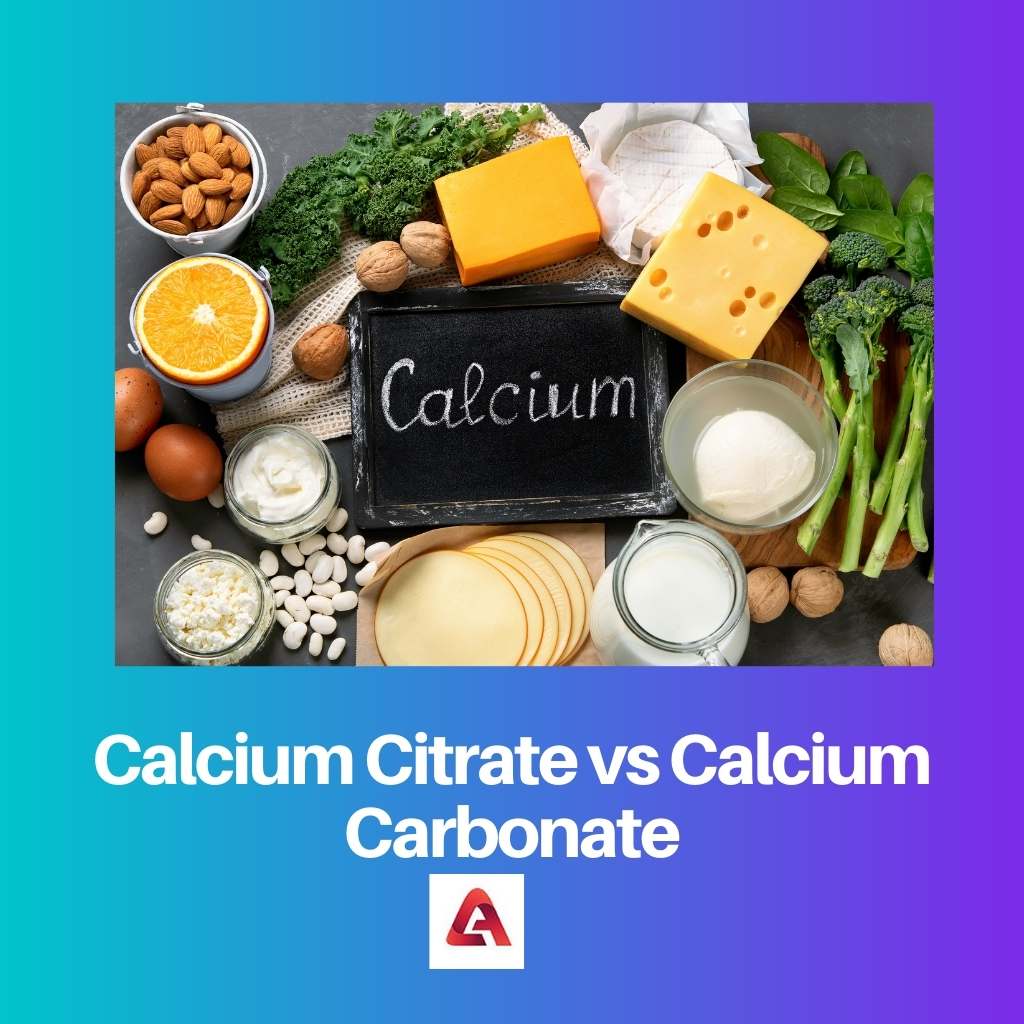Calcium is required for the human body to function at its full potential. Calcium is found in abundance in human bones and teeth. The role of calcium does not end here; we need enough calcium to structure the muscles and execute muscle movement, and the nerves require calcium to function properly. As we get older, we can’t keep up with the amount of calcium our bones need, resulting in a deficiency. As a result, we’ll be talking about two calcium supplements on the market: calcium citrate and calcium carbonate.
Key Takeaways
- Calcium citrate is a more soluble calcium supplement, while calcium carbonate is less soluble but contains a higher percentage of elemental calcium.
- Calcium citrate can be taken with or without food, while calcium carbonate should be taken with food.
- Calcium citrate causes fewer gastrointestinal side effects compared to calcium carbonate.
Calcium Citrate vs Calcium Carbonate
Calcium Citrate and Calcium Carbonate differ because their chemical formulas are different. Calcium Citrate is a calcium salt of citric acid, whereas Calcium Carbonate is a carbonate salt. They both are calcium salts with different anions, citrate, and carbonate. We’ll also look at their different functions as a micronutrient supplements.

The calcium salt of citric acid is calcium citrate. It is translucent and has a crystalline structure. It’s a clear powdery organic compound. It can be found in natural sources such as limestones or citrus foods containing citric acid and can also be created in a laboratory. Calcium Citrate is a calcium source that can be taken as a supplement and absorbs faster than calcium carbonate.
Calcium carbonate is a calcium salt that is formed when positive (cation) calcium reacts with negative (anion) carbonate. The salt oxidizes to calcium oxide and releases carbon dioxide at higher temperatures. It has a white powdery appearance and comes in the form of crystals. In contrast to Calcium Citrate, the rate of absorption of Calcium Carbonate in the body is lesser.
Comparison Table
| Parameters of comparison | Calcium Citrate | Calcium Carbonate |
|---|---|---|
| Chemical formula | Ca3(C6H507)2 | CaCO3 |
| Molecular weight | 498.46 g/mol | 100.0869 g/mol |
| Calcium content | 21 percent (approx) | 40 percent (approx) |
| Absorption | The absorption rate is more than twenty percent more than CaCO3. | The absorption rate is lower. |
| Application | Calcium Citrate helps in softening hard water. | Calcium carbonate raises the calcium concentration in water, resulting in hard water. |
What is Calcium Citrate?
Calcium Citrate is an organic compound with a white crystalline or powdery texture that can be identified. It has the molecular formula Ca3(C6H507)2 and a molecular weight of 498.46 g/mol. The use of Calcium Citrate as a micronutrient supplement is discussed here. Calcium is an important micronutrient that is found in human bones, teeth, muscles, and nerves. And a lack of calcium in the body can have a variety of consequences. Calcium citrate can be taken as a supplement to prevent calcium deficiency, which can otherwise lead to serious consequences. It’s widely available in drugstores and has been compared to calcium carbonate; let’s see what the differences are.
According to a Harvard study, calcium citrate has a higher absorbance in the human body than calcium carbonate. This is also because, as an organic compound, it dissolves in the body even without water. Aside from that, it has antacid properties and is used in industry for the chemical reaction that converts it to quicklime. Calcium citrate has a higher molecular weight than calcium carbonate. In terms of chemical properties, it is sour in acid, as any acid would be. Because of the citrate ion’s ability to chelate, it can turn hard water into soft water.

What is Calcium Carbonate?
Calcium carbonate has the chemical formula CaCO3 and is a calcium salt. It is used as a supplement to control calcium deficiency in the body. We need enough calcium in our bodies to maintain strong bones and teeth and healthy muscles and nerves. We may experience difficulties if our bodies are unable to support the amount of oxygen required by our bodies. Carbon, calcium, and oxygen are the three elements that make up calcium carbonate. It occurs naturally in rocks, primarily limestone. Its molecular weight per mole is 100.09 grams per mole. It is distinguished by its translucent colour and lack of odour. It has a flaky or powdery texture and can also be crystalline.
Calcium carbonate, unlike calcium citrate, is slowly absorbed and has a lower bioavailability. However, calcium carbonate has a higher calcium content. Calcium carbonate has a calcium content of about 20% to 21%, whereas calcium carbonate has a calcium content of 40%. Furthermore, this is one factor contributing to the hardening of water. Also, when it comes to availability, it is one of the most widely available chemical sediments. Compared to calcium citrate, calcium carbonate is less expensive. Calcium carbonate undergoes further oxidation, resulting in calcium oxide and carbon dioxide.

Main Differences Between Calcium Citrate and Calcium Carbonate
- Calcium citrate has the molecular formula Ca3(C6H507)2, and calcium carbonate has the molecular formula CaCO3.
- Calcium citrate has a molecular weight of 498.46 grams per mole, while calcium carbonate has a molecular weight of 100.09 grams per mole.
- Calcium citrate is 20% more bioavailable than calcium carbonate.
- Calcium citrate has a 20-21% calcium content, while calcium carbonate has a 40% calcium content.
- Hard water is softened by calcium citrate, whereas hard water is caused by calcium carbonate.

- https://europepmc.org/article/med/11329115
- https://asbmr.onlinelibrary.wiley.com/doi/abs/10.1002/jbmr.5650030303
Last Updated : 11 June, 2023

Piyush Yadav has spent the past 25 years working as a physicist in the local community. He is a physicist passionate about making science more accessible to our readers. He holds a BSc in Natural Sciences and Post Graduate Diploma in Environmental Science. You can read more about him on his bio page.

The molecular weight and calcium content differences between calcium citrate and calcium carbonate influence their bioavailability and functionality. It’s important to consider these factors when choosing a supplement.
The distinct properties and uses of calcium citrate and calcium carbonate highlight the significance of their chemical differences. It’s crucial to have a comprehensive understanding of these supplements for optimal benefits.
Calcium citrate is indeed more soluble than calcium carbonate, and the differences in their chemical formulas contribute to these characteristics. The relevance of these differences in their functions as micronutrient supplements is significant.
The role of calcium citrate in softening hard water and the biological impact of its chemical properties further elucidate its distinct characteristics compared to calcium carbonate, signifying the need for a nuanced understanding of these supplements.
The comparison table perfectly illustrates the distinctions between calcium citrate and calcium carbonate based on their chemical formulas, molecular weights, and application. These differences are key to understanding their roles as supplements.
Calcium carbonate is a more cost-effective option compared to calcium citrate, and its wider availability may influence consumer choices when considering calcium supplements.
The organic compound nature of calcium citrate contributes to its higher absorbance and antacid properties, which are important factors to consider in its comparison to calcium carbonate as a supplement.
It’s interesting to note that calcium citrate absorbs faster and has fewer gastrointestinal side effects than calcium carbonate, which may impact how these supplements are utilized by different individuals.
The relevance of calcium citrate and calcium carbonate as essential micronutrient supplements emphasizes the critical role of understanding their properties and differences for informed decision-making when choosing a supplement.
The molecular weight and chemical properties of calcium citrate and calcium carbonate underscore the critical differences in their functionality and absorption rates, shaping their roles as essential micronutrient supplements.
The differences in bioavailability and calcium content between calcium citrate and calcium carbonate offer valuable insights into their effectiveness as supplements, influencing considerations for individual dietary needs and supplement preferences.
The chemical formulas and molecular weights of calcium citrate and calcium carbonate are an important factor to consider when choosing between the two. Their differences may affect absorbance and bioavailability.
Calcium citrate and calcium carbonate are both essential for the body but have different characteristics. Calcium citrate helps in softening hard water, while calcium carbonate can raise the calcium concentration in water, resulting in hard water.